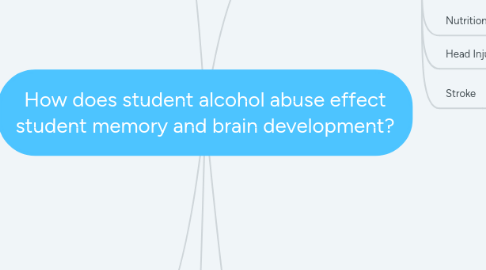
1. Alcohol Effect of Brian
1.1. Neural Recepters
1.1.1. more time and research needed
1.2. Effects From Intoxication
1.2.1. Alcohol is a Depressant and shuts down different parts of the Brain
1.2.2. Alcohol CHART 1.1
1.2.3. Ethanol is an irritant and a toxin to tissues and organs of the body, including the esophagus, the stomach, the liver, and the pancreas. The warm feeling generated by drinking whiskey is the irritant effect of ethanol on the esophagus and the stomach (Alcohol 3)
1.2.4. Alcohol is a drug that the body starts to adjust you causing your tolerance to increase. Which could cause you chances of addiction to increase.
1.2.5. The effects of ethanol on the brain and body, however pleasant they may feel at low doses, are actually a form of poisoning. (Alcohol 9)
1.2.6. Alcohol effects are not reversed by caffeine they are actually just a aware drunk because it just turns on some of the brain.
2. General effect and result of alcohol on students
2.1. Death from alcohol poisoning
2.2. School problems such as higher absence and getting low grades
2.3. Social problems such as patience disorder and lack of participation in youth activities
2.4. Legal problems such as arrest for driving or physically hurting someone while drunk
2.5. Physical problems, such as hangovers or illnesses
2.6. Unwanted, unplanned, and unprotected sexual activity
2.7. Disruption of normal growth and sexual development
2.8. Higher risk for suicide and homicide
2.9. unintentional injuries, such as burns, falls, and drowning
2.10. Memory problems
2.11. Abuse of other drugs
2.12. Changes in brain development
3. Nice things of alcohol
4. Memory process
4.1. Encoding
4.1.1. Perceiving stimuli
4.1.1.1. Having attention on the stimuli
4.1.1.1.1. Decoding perceived sensations
4.2. Conlidation
4.2.1. Memory stabilization
4.2.1.1. Straining via a sort of filter to protect us from storing too much information
4.2.1.1.1. Long-term memory potentiation
4.3. Storage
4.3.1. stored in various parts of brain
4.4. Recall/Retrieval
4.4.1. Recognition, inference, or reconstruction of the information
4.4.1.1. Recall or retrieval of memory
5. Memory Loss
5.1. Medications
5.1.1. A number of over the counter drugs are able to have side effects that can cause memory loss. Some drugs include antidepressants, antihistamines, anti-anxiety medications, muscle relaxants, tranquilizers, sleeping pills, and pain medications.
5.2. Tobacco
5.2.1. Smoking causes memory loss by reducing the amount of oxygen that gets to the brain. People who smoke find it hard to connect faces with names than nonsmokers
5.3. Drug Use
5.3.1. Illicit drugs can change chemicals in the brain that can make it hard to recall memories.
5.4. Sleep Deprivation
5.4.1. Quality of sleep is important memory. Very little sleep or waking frequently can lead to fatigue, which interferes with the ability to retrieve information.
5.5. Depression & Stress
5.5.1. Being depressed can affect memory by making it difficult to pay attention. When you are tense and your mind is distracted, your ability to remember can suffer.
5.6. Nutritional Deficiency
5.6.1. Deficiencies in vitamin B1 and B12 specifically can affect memory.
5.7. Head Injury
5.7.1. A severe hit to the head can injure the brain and cause both short and long term memory loss.
5.8. Stroke
5.8.1. Occurs when the blood supply to the brain is stopped by a blockage of a blood vessel to the brain or leakage of a vessel into the brain. Strokes often cause short term memory loss.

